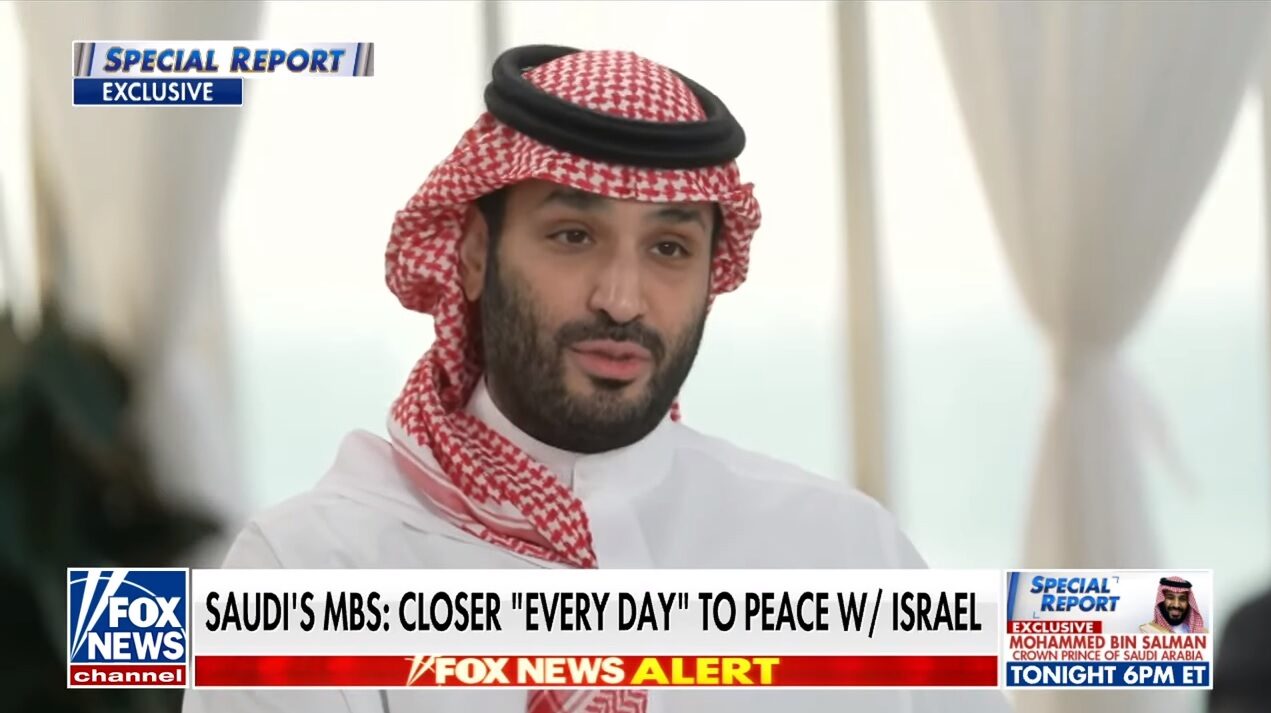Advice to Israel: Don’t Take MBS for Granted
The Saudi crown prince has confirmed that the kingdom and Israel are drawing closer to normalization, but he will not make the same mistake as other Arab countries and the PLO, and he will demand Israeli concessions in return
Speaking last week in his first televised interview since 2019, Saudi Crown Prince and Prime Minister Mohammed bin Salman, also known as MBS, came across as a leader whose words were not mere rhetoric but substantial, based on information, logic, and data.
As part of the new generation of leaders in the Arab world who were educated in the West—mainly in the United States but also in Europe—the prince acknowledged that his country, established in 1932 by his grandfather, King Abdulaziz Al Saud, had made many mistakes. He said that he had taken it upon himself to prevent future errors and to modernize the monarchy through his Saudi Vision 2030 program. He admitted that many laws need to change, noting that his country respects the rule of law but that a judge who rules based on faulty laws cannot be blamed.
His words were auspicious. He sounded sure. Indeed, from the beginning of his career, he has promoted several social reforms that Saudi society considered taboo until he became crown prince in 2017.
MBS is the actual ruler of the monarchy, although his 88-year-old father, King Salman bin Abdulaziz Al Saud, is still in good shape. MBS does not want to wait until he becomes king to start his reforms. He wants to lead Saudi Arabia to compete with leading countries of the world such as India, China, Russia, and others. Why not? After all, the Saudis have the financial and human resources to do so.
He made it clear that if Saudi Arabia does normalize ties with Israel, his country will expect something from Israel in return
The question of normalizing ties between Saudi Arabia and Israel was the most significant aspect of the Fox News interview. MBS’s response was carefully worded. He neither denied nor confirmed that normalization was imminent. He made it clear that if Saudi Arabia does normalize ties with Israel, his country will expect something from Israel in return.
Saudi Arabia is not the United Arab Emirates. The Emiratis were happy to normalize ties with Israel in return for nothing other than the prestige of joining the Abraham Accords, which were sponsored by President Donald Trump.
Give the gift of hope
We practice what we preach:
accurate, fearless journalism. But we can't do it alone.
- On the ground in Gaza, Syria, Israel, Egypt, Pakistan, and more
- Our program trained more than 100 journalists
- Calling out fake news and reporting real facts
- On the ground in Gaza, Syria, Israel, Egypt, Pakistan, and more
- Our program trained more than 100 journalists
- Calling out fake news and reporting real facts
Join us.
Support The Media Line. Save democracy.


Saudi Arabia, by contrast, is careful. It cannot allow itself to be fooled by Israel. The Saudis know how vital normalization is for Israel. They know the current government under Prime Minister Benjamin Netanyahu is neither willing nor able to pay the price of normalization with the Saudis. This explains why normalization talks are happening between Riyadh and Washington while Israel is not directly involved. Talking to the Americans is not controversial. Speaking to Israel is.
The leaders of the UAE made the grave mistake of volunteering a strategic initiative toward Israel without receiving anything in return. They were not the first to do so. Who said that leaders learn from the mistakes of others?
The Palestinians were no exception. The PLO made its first strategic mistake in November 1988, when, in the Palestinian Declaration of Independence delivered by then-PLO leader Yasser Arafat at the Palestinian National Council session in Algiers, it granted Israel de facto recognition by accepting UN Resolutions 181, 242, and 338. That historic concession by the PLO has not been repaid to this day.
Five years later, the PLO repeated the same mistake, when Arafat signed a letter to then-Israeli Prime Minister Yitzhak Rabin in which he said that the PLO “recognizes Israel’s right to exist in secure and recognized borders.”
Arafat did not get what he should have insisted on receiving from Israel in return. He and Rabin were meant to exchange letters of mutual recognition. Rabin did not reciprocate the Palestinian recognition of Israel by recognizing the Palestinian right to statehood in secure and recognized borders. All Rabin recognized in his letter to Arafat was the status of the PLO as “the legitimate representative of the Palestinian people.”
Both leaders should have signed just one letter, each recognizing the right of the other to exist in secure and recognized borders. Such a document would have spared the Palestinians and the Israelis three decades of grief, blood, and destruction.
None of the Israeli governments that have taken over since Rabin’s assassination in 1995 was prepared to recognize the Palestinian people’s right to freedom and independence. Ehud Olmert, prime minister between 2006 and 2009, was an exception. He did his best. But the police investigation into corruption charges against him blew up any chance he and Palestinian President Mahmoud Abbas had to reach an agreement.
The longer Israel postpones its recognition of the Palestinian national right to freedom and independent statehood, the longer the distance to peace with the Arabs. This is the Palestinian currency with which Israel needs to pay in return for normalizing ties with Saudi Arabia.
In 1972, after then-Egyptian President Anwar Sadat expelled 20,000 Soviet military advisers from Egypt in a gesture of goodwill toward the West—mainly the US—he flew to Washington asking for something in return. Henry Kissinger, then US secretary of state, said that Sadat could have bargained to force Israel out of all the territories it occupied in 1967 in return for such a move. But he said the US “doesn’t pay for gifts already received.”
MBS must have thought of all that when he was asked about normalization with Israel. He said that the two countries are drawing closer to normalization every day. However, he did not specify how far or close normalization is.
The fact remains that only Israel can define this distance. The longer Israel postpones its recognition of the Palestinian national right to freedom and independent statehood, the longer the distance to peace with the Arabs. This is the Palestinian currency with which Israel needs to pay in return for normalizing ties with Saudi Arabia.
MBS clarified his opposition to acquiring nuclear weapons in the interview, saying that weapons of that sort should not be used. He does want his country to develop nuclear power for civilian purposes, though. Therefore, he cannot tolerate Israel vetoing a Saudi Arabian nuclear program, especially since Israel has not signed the Nuclear Non-Proliferation Treaty and has repeatedly refused to allow International Atomic Energy Agency inspectors to visit any of its nuclear reactors.
The Saudis know that they are the leaders of the Islamic world. They do not have the luxury of allowing themselves to lose such a significant status in exchange only for Israeli approval. MBS was sincere in his Fox televised interview. He meant what he said about a different future for the country.
Israel, meanwhile, is making a big mistake if it takes MBS for granted. The man is ambitious. He is too young to gamble his future career only to appease an Israeli government that is as shaky as troubled waters.


